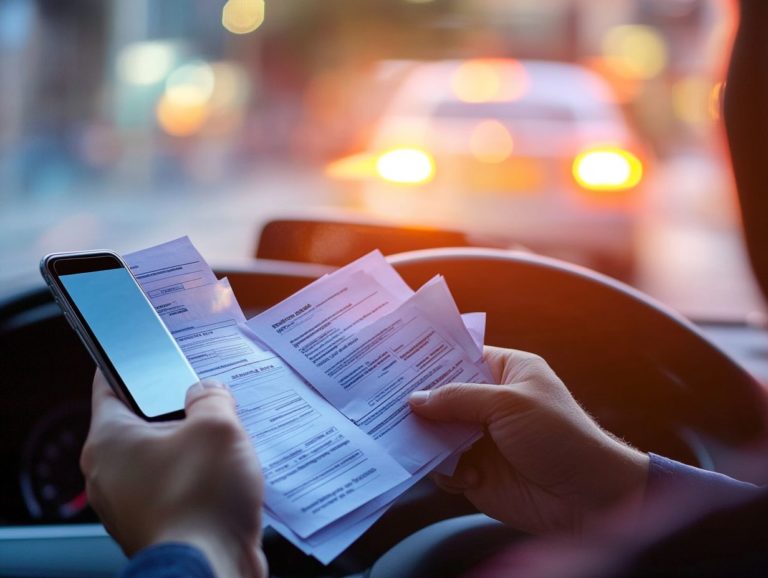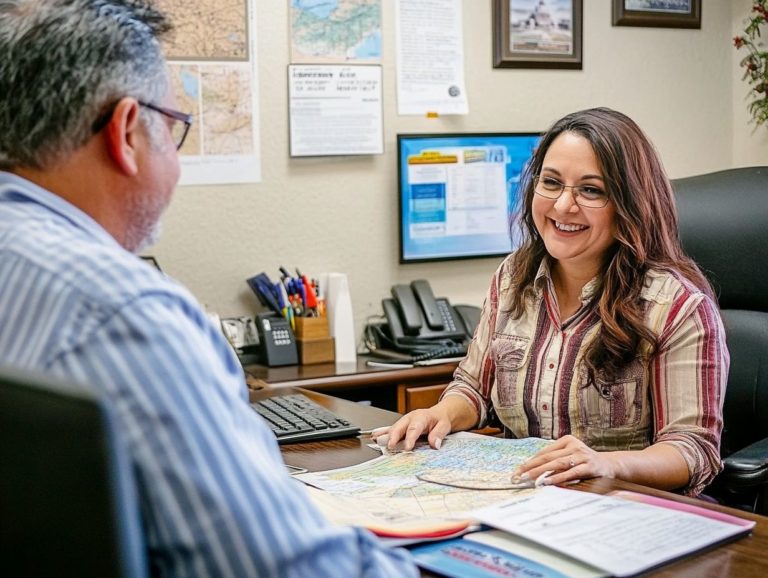How to Obtain a Certificate of Financial Responsibility
A Certificate of Financial Responsibility (CFR) is a crucial document for individuals and businesses. It shows your ability to pay financial obligations in various situations.
Whether you’re a driver looking for auto insurance or a business owner dealing with liability, understanding the importance of a CFR is essential.
In this article, you will learn what a CFR is, who needs one, how to obtain it, and the different types available. We ll also cover the renewal process and the potential consequences of neglecting this important requirement.
Keep reading to stay informed and compliant!
Contents
- Key Takeaways:
- Understanding a Certificate of Financial Responsibility
- Who Needs a Certificate of Financial Responsibility?
- How to Obtain a Certificate of Financial Responsibility
- Types of Certificates of Financial Responsibility
- Maintaining a Certificate of Financial Responsibility
- Consequences of Not Having a Certificate of Financial Responsibility
- Frequently Asked Questions
- What is a Certificate of Financial Responsibility?
- Why would I need a Certificate of Financial Responsibility?
- How do I obtain a Certificate of Financial Responsibility?
- Who can issue a Certificate of Financial Responsibility?
- Is there a fee for obtaining a Certificate of Financial Responsibility?
- How long is a Certificate of Financial Responsibility valid for?
Key Takeaways:

- A CFR proves an individual’s or entity’s ability to handle financial responsibilities in specific situations.
- It is required for drivers of commercial vehicles, those involved in accidents without insurance, and individuals with suspended licenses.
- To get a CFR, follow the necessary steps and provide required documents. You must renew it to avoid penalties.
Understanding a Certificate of Financial Responsibility
A Certificate of Financial Responsibility is vital for vehicle owners in California. It helps you comply with state laws about financial responsibility.
This certificate acts as proof of your insurance or ability to pay for damages from traffic accidents, protecting you and the public.
Definition and Purpose
The CFR ensures you meet financial liability laws by providing insurance coverage for vehicle damages. It requires you to show that you can cover accident costs.
This certificate reassures the public that victims of accidents will receive compensation. Without it, you risk serious legal consequences, including fines and potential suspension of your driving privileges.
Who Needs a Certificate of Financial Responsibility?
A CFR is essential for many situations, especially in California, where it s legally required. Drivers of commercial vehicles and those involved in accidents without sufficient insurance must obtain one.
If you own a vehicle, demonstrating that you meet minimum liability insurance requirements is crucial. Consider alternatives like a surety bond or cash deposit if needed.
Applicable Situations and Requirements
A CFR is needed when you must show your financial capability for operating a vehicle. This is especially important if you’ve had an accident without adequate insurance.
If you’ve been convicted of driving under the influence, you might need to provide this proof to the Department of Motor Vehicles. Knowing the specific criteria set by the DMV can help you navigate these requirements easily.
How to Obtain a Certificate of Financial Responsibility

Obtaining a Certificate of Financial Responsibility in California is a straightforward yet crucial process. It requires attention to specific steps and documentation.
Begin by gathering your insurance information. This includes proof of insurance and any pertinent DMV records, such as an SR-22 form, which is a document that proves you have car insurance if you fall into the high-risk driver category. This important document must be submitted to the DMV, along with the necessary electronic reporting from your insurance provider, to ensure you meet the financial responsibility laws.
Steps and Documents Needed
The steps and documents required to obtain a Certificate of Financial Responsibility can differ based on your specific circumstances. Generally, you will need an SR-22 form and proof of insurance, alongside other documentation mandated by the DMV.
Besides these essential requirements, you must also show a driver’s license or state ID, as well as any prior driving records or notices of violations.
Make sure you follow local rules to avoid big delays. Submitting an application that clearly outlines the coverage details of your insurance policy is vital to the process.
Always verify whether specific forms or applications are necessary; doing so will facilitate a smoother interaction with the DMV and help you avoid delays in obtaining the required certificate.
Types of Certificates of Financial Responsibility
You ll find a range of Certificates of Financial Responsibility tailored to meet diverse needs and circumstances under California law. The most common is the SR-22, which high-risk drivers must obtain to demonstrate liability insurance after certain driving violations.
There s also the FR-44, frequently required for those with specific legal obligations. You can also consider options like self-insurance or securing a surety bond, both of which offer viable methods to showcase compliance with insurance laws.
Different Types and Their Uses
Different types of Certificates of Financial Responsibility, like the SR-22 and FR-44, serve distinct purposes tailored to your driving needs.
These documents are crucial for individuals who have faced past challenges, such as DUI convictions or license suspensions. They require proof of your ability to meet financial obligations arising from accidents or damages.
The SR-22 is typically needed in states that demand evidence of liability coverage after infractions, while the FR-44 applies to those who have committed serious offenses, including driving under the influence.
Depending on the severity of your offense, you may be required to maintain this proof for several years, ensuring compliance with both state laws and insurance regulations.
Maintaining a Certificate of Financial Responsibility
Maintaining a Certificate of Financial Responsibility requires you to carefully follow the renewal steps and compliance mandates outlined by California law. It’s essential to ensure that your insurance coverage remains valid and that you provide the necessary proof of insurance to the DMV when required.
Neglecting these obligations could result in suspended registration or penalties, ultimately jeopardizing your driving privileges.
Renewal and Compliance Requirements

Renewal and compliance requirements for a Certificate of Financial Responsibility are essential for maintaining your valid driving privileges. Typically, these certificates require annual renewal, though specific timelines may vary depending on your state.
To facilitate a seamless renewal process, gather all necessary documents, including proof of insurance coverage, identification, and any previous renewal notices. Adhering to these renewal schedules is crucial; neglecting to maintain the required insurance can result in penalties, such as fines or even the suspension of your driving privileges.
Staying informed about your insurance status not only helps you avoid legal complications but also contributes to safer roads for everyone.
Summary Checklist:
– Gather your insurance information.
– Obtain necessary DMV documents like the SR-22.
– Present personal identification.
– Follow local regulations.
– Renew your Certificate of Financial Responsibility annually.
Consequences of Not Having a Certificate of Financial Responsibility
Not possessing a Certificate of Financial Responsibility can have serious consequences for you, particularly as a driver in California. Without this essential certificate, you risk facing vehicle suspension, hefty fines, and even potential legal action, especially if you re involved in driving offenses that lead to personal injury or property damage.
As an uninsured driver, you could be held liable for any damages resulting from a traffic collision, which could lead to significant financial repercussions. Understanding this certificate is vital for your financial safety!
Potential Penalties and Risks
The potential penalties and risks of not having a Certificate of Financial Responsibility are serious. You could face fines, increased insurance rates which means your monthly payments for insurance could go up and even legal action against you.
These consequences can escalate your financial liability, with hefty penalties that might strain your budget. Your driving record can also take a hit, accumulating points that raise the risk of license suspension.
Without this crucial certificate, dealing with insurance companies becomes more complicated; they often respond to such lapses by hiking your premiums or denying coverage altogether. The combined legal and financial implications highlight the importance of adhering to responsibility requirements. Compliance isn t just a good practice; it s essential to avoid a downward spiral of rising costs and potential legal headaches.
Frequently Asked Questions
Here are some common questions regarding the Certificate of Financial Responsibility:
What is a Certificate of Financial Responsibility?
A Certificate of Financial Responsibility is a document that proves an individual’s ability to meet their financial responsibilities, such as paying off debts or providing financial support.
Why would I need a Certificate of Financial Responsibility?

A Certificate of Financial Responsibility may be required for various reasons, such as obtaining a loan, renting an apartment, or even as part of a legal agreement.
How do I obtain a Certificate of Financial Responsibility?
The process for obtaining a Certificate of Financial Responsibility may vary, but generally, it involves providing documentation of your financial standing, such as bank statements, tax returns, or proof of income.
Who can issue a Certificate of Financial Responsibility?
A Certificate of Financial Responsibility can be issued by a financial institution, such as a bank or credit union, or by a government agency, depending on the specific requirements and purpose.
Is there a fee for obtaining a Certificate of Financial Responsibility?
You might have to pay a fee to get the certificate. Check with the issuing entity for specific costs.
How long is a Certificate of Financial Responsibility valid for?
The validity period of a Certificate of Financial Responsibility may vary, but generally, it is valid for a specific period, such as one year, and may need to be renewed if needed for a longer duration.
Have more questions? Reach out to us for help!
Apply for your Certificate of Financial Responsibility today to avoid risks!






